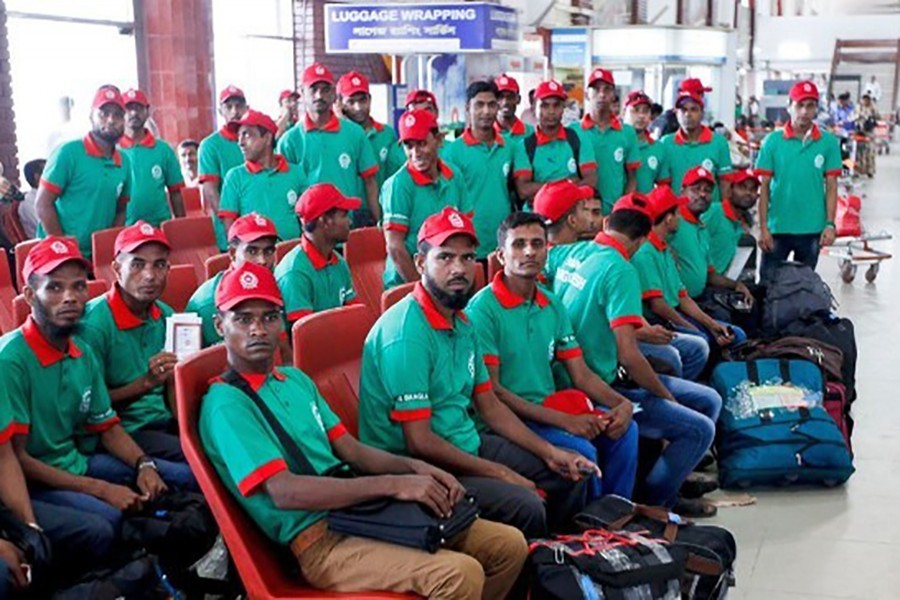The amnesty programme for undocumented foreign workers, including Bangladeshis, staying in Malaysia begins today (Thursday), under which they are given an opportunity to return to their countries voluntarily.
The Malaysian immigration authorities on July 19 announced the 'Back 4 Good (B4G)' programme which will run through December 31.
Under the programme, about 400,000 illegal foreign workers can return home, said Datuk Khairul Dzaimee Daud, director-general of immigration department of Malaysia, according to the media report.
Presently, about 100,000 Bangladeshi workers are staying undocumented in Malaysia after they failed to be regularised under a rehiring programme that ended on June 30 last, according to officials at the Bangladesh High Commission in Kuala Lumpur.
However, Bangladeshis staying in the Southeast Asian country told the FE correspondent over phone that the figure would be much higher.
These workers spent a large amount of money to get regularised under the rehiring programme but failed to avail of the opportunity, they said.
They are now frustrated as most of them came to Malaysia spending a huge amount of money but now they have to go back to the country almost empty-handed, they said.
The workers also said the Bangladesh government should have taken steps for the regularisation of undocumented workers before negotiating for the reopening of the market for fresh workers.
They also posed a question: What is the use of sending new workers while many Bangladeshis would have to go back empty-handed?
Contacted, Mohammad Zahirul Islam, labour counsellor at the Bangladesh High Commission in Malaysia, said the 'Back 4 Good (B4G)' programme begins on Thursday, under which undocumented workers can go back home after paying Malaysian Ringgit (RM) 700 each.
The high commission has taken up an awareness programme so that workers can go back home without facing any hassles, he added.
When asked, he said some 500,000 Bangladeshis had applied for regularisation under the rehiring programme and majority of them became successful.
Talking to the FE, Abu Hayat, a Malaysia-based freelance researcher, said most of the undocumented Bangladeshi workers applied for regularisation, but 50 per cent of them could not be regularised because of various reasons such as fraudulent practices by middlemen and outsourcing companies.
The Malaysian authorities had engaged three outsourcing companies in helping the immigration department with the rehiring programme, but these companies resorted to malpractice in connivance with middlemen and a section of officials, he said.
"Many Bangladeshis who even completed every stage of rehiring successfully did not get visa or work permits," he said, adding that these workers are still waiting for responses from the immigration department.
But now they will not get any chance, he added.
Many workers had to spent RM 7,000 to 8,000 each to be regularised under the rehiring prograemme, Mr Hayat said.
He also said the government should have focused on the regularisation of undocumented workers before taking steps for fresh recruitments in Malaysia.
At a programme recently, Expatriates' Welfare and Overseas Employment Minister Imran Ahmed expressed the hope that the Malaysian market would be open to fresh recruitments from Bangladesh in August.
Anwar Hossain, a Bangladeshi worker, said he applied for rehiring through MyEG, a outsourcing company, and paid RM 2,500 in fees, but the company did not do anything for him.
"I contacted the firm several times, but to no avail," he said.
Mr Hossain is now very upset, as he has a large family in Bangladesh. Besides, he has loans to repay.
Obhibashi Karmi Unnayan Programme (OKUP) chairman Shakirul Islam said many workers paid fees for rehiring, but they did not receive any documents for regularisation.
So, the Bangladesh government should start a negotiation with Malaysia to help undocumented workers, he added.
Mr Islam also observed that manpower agencies would be benefited most from fresh recruitment process.
He stressed the need for adopting a policy giving priority to the returnee workers so that they can go to Malaysia again, he added.
More than 1.0 million workers went to Malaysia with jobs since 1978, according to the Bureau of Manpower Employment and Training data.


